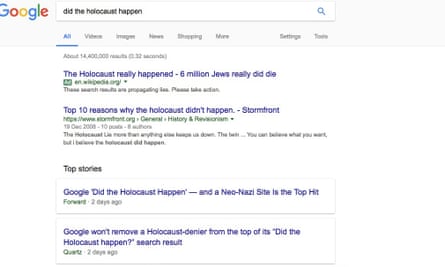A new generation of Holocaust deniers is emerging through a clutch of popular “gateway” conspiracy theories, according to one of the UK’s leading experts on the subject.
As Denial, a film about the disgraced historian and notorious Holocaust denier David Irving, hits cinemas later this month, attention is focusing on the ageing generation of deniers who emerged with Irving at its vanguard and are now dying out. But it appears that Holocaust denial has found new momentum in the digital age.
The UK’s foremost academic on the subject claims a new internet-based generation is embracing denial, having been drawn to it out of antisemitism or a belief in conspiracy theories.
Dr Nicholas Terry, a history lecturer at Exeter University, estimates that there are now thousands of “low-commitment” Holocaust deniers online. Rather than recruiting from established far-right denial forums, they are attracting followers drawn to outlandish theories such as those surrounding the assassination of JFK, 9/11, the moon landing and the Sandy Hook school massacre.
“In one sense, the internet means Holocaust deniers have got a lot of competition,” Terry said. “On the other, in this more free-form world, deniers have been able to attract a certain minority from the world of conspiracy theories. There’s a sense of disorientation taking place when it comes to where people are getting their news from.
“This kind of free-for-all on the internet creates a milieu that has seen people who would normally identify along the left of the political spectrum gravitate towards ideas that are more at home on the far right.”
The release of Denial – which centres on the libel trial brought by Irving against the Holocaust scholar Deborah Lipstadt – follows the controversy that erupted when it emerged Google’s algorithms were recommending antisemitic, white nationalist and Holocaust denier websites for searches of the question: “Did the Holocaust happen?" The film has already been attacked by the new generation of deniers on YouTube, Reddit and Twitter.

Terry, who has monitored Holocaust denial online for 10 years and is co-editing a forthcoming book, Holocaust and Genocide Denial: A Contextual Perspective, has personal experience of their tactics, having been trolled online. He founded the anti-denial blog, Holocaust Controversies, to “debunk” their claims.
He said that many claiming that the Holocaust did not happen were often less intellectual than the earlier generation of deniers. They were an “international crowd – lots of Americans, British, Scandinavians, and west Europeans, as well as some Brits” – who made little attempt to justify their views with facts, resulting in what Terry termed a “Twitterification” of denial.
Several of the new generation of deniers have become well known online. Eva Lion, a Canadian nationalist on the extreme right, was banned from YouTube having amassed tens of thousands of followers. Reality-TV star Tila Tequila was thrown off Celebrity Big Brother after it emerged she had posted messages defending Hitler, as well as antisemitic and white nationalist comments.
While the majority of new deniers are young and hail largely from the “alt-right”, a significant number are middle-aged or older, Terry said.
“What I’ve observed in the last 10 years is that, while the majority of deniers one encounters are still rightwing and Nazis, they are always peppered with a number of unaffiliated individuals who would consider themselves to be liberal or leftwing and have arrived at their position having been anti-Zionist or anti-Israel.”
Their attraction to Holocaust denial, Terry said, had coincided with an upsurge in antisemitism on the internet. Many drawn to such beliefs, he suggested, were vulnerable to lies being peddled as truth.
“They are people who have reached their 40s or 50s and have embraced the internet as it has grown and new platforms have come along. They have moved away from quality newspaper-reading mentality; maybe they’re professionals, some may have degrees, but they are not skilled in assessing sources in history. When you interact with them, you realise that they have no clue as to how we know anything about the past, about how history works, what information is available. They are willing to go along with certain ideas that are summarised for them and simplified in web articles or videos.”
He added: “Lipstadt said that arguing with a denier was like trying to nail jelly to a wall. I would say it’s now like trying to nail smoke to a wall. There’s almost no substance.”
